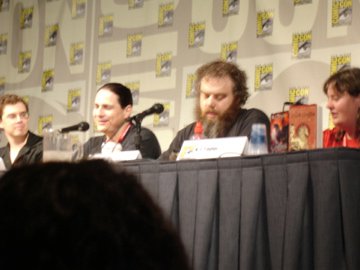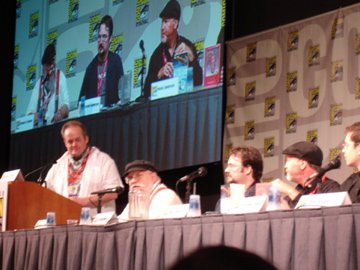San Diego Comic Con officially began Thursday morning as hordes of people from all walks of fandom rushed into the exhibit hall and panel rooms. After a busy shift in the Tor Booth (#2707) giving away free swag and meeting new people, it was time to head upstairs for the noon “Putting the ‘Epic’ in Epic Fantasy” panel where some of the genre’s brightest stars talked about their craft.
Brandon Sanderson (The Way of Kings), Kevin J. Anderson (Terra Incognita), Chistopher Paolini (The Inheritence Cycle), Peter Orullian (The Unremembered), Patrick Rothfuss (The Name of the Wind), and K.J. Taylor (The Fallen Moon series) were on hand to discuss the history of epic fantasy and their approach to writing it.
George R.R. Martin was also a guest on the panel, which surely attributed to the extremely long line to get into Ballroom 6A. There had to be close to a thousand people packed into the room and every one of them a dedicated reader. In a convention that has largely morphed into one about movies and video games, it was really great to see such enthusiasm for books.
The discussion began with the panel trying to define what made something epic. I suspected it had something to do with having a mighty beard, as most of the panelists did. (Christopher Paolini expressed his envy.) Patrick Rothfuss said that being called an epic fantasy writer was more people seeing his big, heavy book and deciding that that’s what it was. While most of the panelists agreed that the length of the story was crucial to epic fantasy, Paolini pointed out that A Wizard of Earthsea was only forty thousands words long, tops, but no one would say it wasn’t an epic. The most agreed upon shared trait between the panelists’ books was that each novel contained many smaller stories that were part of a larger one. Sometimes with dragons. “The main character is the story itself, moving forward chapter by chapters,” said Kevin J. Anderson.
For Brandon Sanderson, epic fantasy is a matter of immersion in a world, through many inhabitants’ eyes. Their dramas, choices, failures. It’s a cycle that is never-ending. (Much like The Wheel of Time series, the moderator, Michael Spradlin quipped, to thunderous applause.)
For George R.R. Martin, epic fantasy is mostly a marketing category, shorthand to distinguish their books from others in the genre.
The discussion then turned to the craft involved in writing all of these bestselling epic fantasy series. You seldom see so many genre masters in one room, dispensing free advice to aspiring writers. Spradlin asked how each panelist approached their stories. Is it the world that is then populated, or the character that populates the world?
Every writer has their own methods. For Kevin Anderson, the world comes first, then the people the world needs in it. K.J. Taylor was adamant that characters come first. Sanderson agreed. “Unless there’s a fantastic character, what’s the point?” But most of the panelists agreed the question was a tough one because the answer is usually a mix of both. For Martin, he started writing A Game of Thrones after he had an image in his head of wolf pups with their mother dying in the snow. He didn’t know what came after that, but he kept writing to find out. But don’t call him the American Tolkien; as much as he loves worldbuilding, he doesn’t go much beyond what the story needs. He only knows seven words of Dothraki, the seven he used in the books.
Martin may not have ASOIAF’s answer to The Silmarillion in the works, but that doesn’t mean careful plotting doesn’t go into these stories within stories that are the appeal of epic fantasy. I thought Patrick Rothfuss had the best answer: “I used to come down hard on outliners. Outlines struck me as irrational. If I had to, I would make a list of bullet points, and those would have some sub-bullets… and then one day, I’m like, damn, I’m an outliner.“ Orullian, too, talked about the ”beautiful accidents“ of fiction writing that come not from careful planning, but from trying a bunch of different things in a scene until the author finds something that just works.
Some Q&A highlights:
 Brandon Sanderson’s Writing Excuses podcast got some props for helping new writers. A question was asked about how each author knew their stories were ready to be published and it was really interesting to hear the long, hard struggles some of these now hugely popular authors faced as young writers. Sanderson wrote five novels before Elantris, knowing none of them would ever see the light of day; he just wanted to hone his craft and get into a discipline. ”I trained myself to be a writer of books,“ he said firmly. Martin began with short stories. Rothfuss ”latched on to [his] ideas and rewrote it for fourteen years. I don’t recommend it. It’s insane.“
Brandon Sanderson’s Writing Excuses podcast got some props for helping new writers. A question was asked about how each author knew their stories were ready to be published and it was really interesting to hear the long, hard struggles some of these now hugely popular authors faced as young writers. Sanderson wrote five novels before Elantris, knowing none of them would ever see the light of day; he just wanted to hone his craft and get into a discipline. ”I trained myself to be a writer of books,“ he said firmly. Martin began with short stories. Rothfuss ”latched on to [his] ideas and rewrote it for fourteen years. I don’t recommend it. It’s insane.“
When asked what there should be more of in epic fantasy, Rothfuss quickly replied ”Stronger female characters.“ Cue every female in the ballroom cheering and clapping.
The final question was about the panelists’ feelings on ebooks. Unsurprisingly, Martin’s not big on technology. ”I’d rather tie a message to a raven’s leg” but finds his Kindle invaluable on long book tours. Glad to see all of the panelists admit that sometimes epic fantasy is just too big to carry around wherever you go. Paolini said he loves technology, while Rothfuss opened up his hardcover copy of The Wise Man’s Fear and inhaled deeply. Too funny.
Martin ended the panel by saying that ebooks will replace mass market paperbacks in the future, but the beautifully bound, collector’s editions printed on acid-free paper for collectors is here to stay. I would’ve pegged San Diego Comic-Con attendees as early adopters of all kinds of geek tech, but maybe those people are more into science fiction. But the appreciation for the printed page was touching.
All in all, it was an exciting panel and I’m really lucky I got to attend it this year. I went in expecting much of the conversation and audience questions to be strictly Martin-centric, but I was glad to listen to all of the panelists in equal amounts and to hear both the authors and their fans engage in discussions about the craft of writing and mankind’s interest in epic fantasy from the days of The Illiad all the way up to A Dance with Dragons. It was a nice hour of laughs and thought-provoking questions before returning once more into the fray of another very packed Comic Con.
Theresa DeLucci is wearing a sweater right now. Sorry, New Yorkers. Follow her on Twitter for more coverage live from San Diego Comic-Con.










